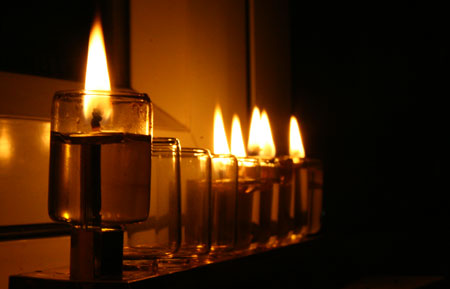V = I·R
{thoughts of an anarchist chossid}
Sunday, October 18, 2015
Wednesday, July 30, 2014
Killing innocent bystanders together with a pursuer
Source: "SACRIFICING THE FEW TO SAVE THE MANY". J. David Bleich, Tradition, Vol. 43, No. 1 (SPRING 2010), pp. 78-86
Finally, from "Preemptive War in Jewish Law" (pp. 3-41), also by Rabbi Bleich:
Monday, January 27, 2014
The Fifth Night of Chanukah

At the farbrenging of the wedding, the Rebbe asked this Jew: "Why do we make such a big deal about Chanukah?" The Jew said he didn't know. The Rebbe said: "Because the fifth night of Chanukah cannot ever be Shabbos. So, it is the greatest darkness. And yet, the light of Chanukah is such that even the greatest darkness can be converted into the light — wherever you are, in Warsaw or in London."
So, this was a nice dvar Torah. The Jew went through the Holocaust and lost all his family. After the war, he came to New York and re-married to start a family anew. He met with the Previous Rebbe and told him: "You know, I've been by your middle son-in-law's wedding in Warsaw." The Previous Rebbe smiled and said: "Oh yeah? He is downstairs, you should go talk to him."
So, the Jew went and met the Rebbe, who, when he saw him, smiled and said: "Well, we meet again after twenty years. When two Jews who hadn't seen each other for a long time meet, they should say a dvar Torah. Now, do you know why we make such a big deal about the fifth night of Chanukah?"
So, the Jew went and met the Rebbe, who, when he saw him, smiled and said: "Well, we meet again after twenty years. When two Jews who hadn't seen each other for a long time meet, they should say a dvar Torah. Now, do you know why we make such a big deal about the fifth night of Chanukah?"
The Jew almost fell from the surprise. The Rebbe continued: "Because the fifth night of Chanukah cannot ever be Shabbos. So, it is the greatest darkness. And yet, the light of Chanukah is such that even the greatest darkness can be converted into the light — wherever you are, in New York or in London."
After this meeting, the Jew moved to Canada and joined a Satmar community. He had children. And, living in Satmar community during the machloikes times, he heard the locals say that the Lubavitcher Rebbe mekarevs rishoim, and how terrible it is, etc. When it was time for his daughter to get married, he went to New York, to get a brocho from the Rebbe. The Rebbe's secretary didn't want to let him in, but the Jew insisted; he said he had already met the Rebbe twice, and that the Rebbe knew him and would be happy to see him. The secretary told him he can go in for one minute, but he should not ask any questions. Just get a brocho and leave.
So, the Jew comes in. And the Rebbe gives him a brocho for his daughter's wedding. The Jew then said that even though he was asked not to ask any questions, he had one question. The Rebbe replied: "Der Shver [the Previous Rebbe] sent you to me, so I have to answer any question you have." He wanted to know about what the Satmar Chassidim said about the Rebbe mekareving rishoim.
So, the Rebbe answered: "Look, if your neighbor's daughter does an aveira, will he abandon her, or will he say that she is his flesh and blood? All the Jews are the [Previous] Rebbe's children."
The Rebbe continued: "We meet again after twenty years. When two Jews who hadn't seen each other for a long time meet, they should say a dvar Torah. Now, do you know why we make such a big deal about the fifth night of Chanukah? Because the fifth night of Chanukah cannot ever be Shabbos. So, it is the greatest darkness. And yet, the light of Chanukah is such that even the greatest darkness can be converted into the light — wherever you are, in Toronto or in London."
The Jew returned to Canada. Some years later, he was planning to go to London to attend a wedding. And his neighbor came to him and told him that his daughter had ran away from the house and was living in London with someone not Jewish. So, when the Jew went to London, he contacted the local shliach, who got in touch with the daughter. She eventually replied that she wanted to come back, and wanted to get in touch with the Jew from Canada. He came in to the shliach's house and met the daughter, who was sitting there in a very emotional state. And when he looked up — he saw five Chanukah candles burning.
Ten years later, he went to the Rebbe, by the dollars, to get a brocho for his grand-daughter's wedding. He told the Rebbe the whole story. The Rebbe smiled and answered: "Der Shver [the Previous Rebbe] was looking far ahead."
Sunday, October 20, 2013
Midas Sdom

(Sodom, modern rendition)
There are four character types among people. One who says, 'What's mine is mine and what's yours is yours' is of average character, and some say, this is the character of Sodom. [One who says] 'What's mine is yours and what's yours is mine' is unlearned. [One who says] 'What's mine is yours and what's yours is yours' is pious. [One who says] 'What's yours is mine and what's mine is mine' is wicked.'
— Pirkey Avos
I was thinking today in the shull and afterwards about the statement in Pirkey Avos about midas Sdom. "What's mine is mine, and what's yours is yours" is an excellent negative law, for which all societies must strive. What was the problem of Sdom? They took this concept, which should be a negative law for the society, and enforced it as a positive law for the individuals: those were prohibited from giving tzedaka (we find in the passed week's parsha that Lot was almost sodomized by the Sodomites for sheltering the guests).
So, the problem is not the absence of social welfare — a healthy respect for property rights of the individuals — but the prohibition for the individuals to use their property to give charity. That is why Pirkey Avos has two opinions about this midda.
What about the character of the tzaddik: "What's mine is yours, and what's yours is yours"? Why can't it be "socialized"? Because when you socialize it, it becomes: "What's yours is mine, and what's mine is yours", a midda of a socialist... I mean, an ignoramus.
The character trait of a tzaddik ("what's mine is yours, and what's yours is yours"), in order to remain within its definition, must be that of a private individual. That is also what we should teach our children: When someone is visiting us, we share our toys. But when we are visiting someone else, we don't force them to share their toys; we respect their wishes about their property.
Thursday, September 12, 2013
Kapporos
Instructions found here: http://www.chabadcenter.com/media/pdf/339/eOux3393298.pdf
Gmar chassima tova!
Gmar chassima tova!
Wednesday, September 11, 2013
Monday, August 5, 2013
Legal breakdown
Sorry I haven't posted for a while. Too busy getting a Ph.D. ... and stuff.
A re-post from Facebook:

Of course, free markets and capitalism are to blame for this, not the corrupt legal system of this country.
A re-post from Facebook:

Of course, free markets and capitalism are to blame for this, not the corrupt legal system of this country.
This is the same situation as with the environmental pollution 100-150 years ago, when the courts sided with large companies (owners of industrial plants, railroads, etc.) in lawsuits brought against the latter by their smaller neighbors. Fast-forward 100 years, and suddenly everyone is environment-conscious and blaming capitalism, free markets, deregulation, profit, and freedom for the environment being messed up... and of course calling for more government!
But what happened then and what is happening now is not "market failure", but a dysfunction within the state-operated monopolized legal system. One single function that the government is theoretically supposed to do — protect people's rights — it has failed at again and again. And everyone, from the right and from the left, is calling for more government in those areas where it's not supposed to be involved at all, when the only solution is more privatization: including that of the legal system!
And, unsurprisingly, the neocon "justices" voted for the corporatist outcome. The two parties in this country are not liberals vs. conservatives. These terms made some sense in the 19th-century UK, but not the US today (Hayek discusses this quite well in his essay "Why I Am Not a Conservative".) Today it's socialists vs. fascists. Pick your poison.
But what happened then and what is happening now is not "market failure", but a dysfunction within the state-operated monopolized legal system. One single function that the government is theoretically supposed to do — protect people's rights — it has failed at again and again. And everyone, from the right and from the left, is calling for more government in those areas where it's not supposed to be involved at all, when the only solution is more privatization: including that of the legal system!
And, unsurprisingly, the neocon "justices" voted for the corporatist outcome. The two parties in this country are not liberals vs. conservatives. These terms made some sense in the 19th-century UK, but not the US today (Hayek discusses this quite well in his essay "Why I Am Not a Conservative".) Today it's socialists vs. fascists. Pick your poison.
Subscribe to:
Posts (Atom)







